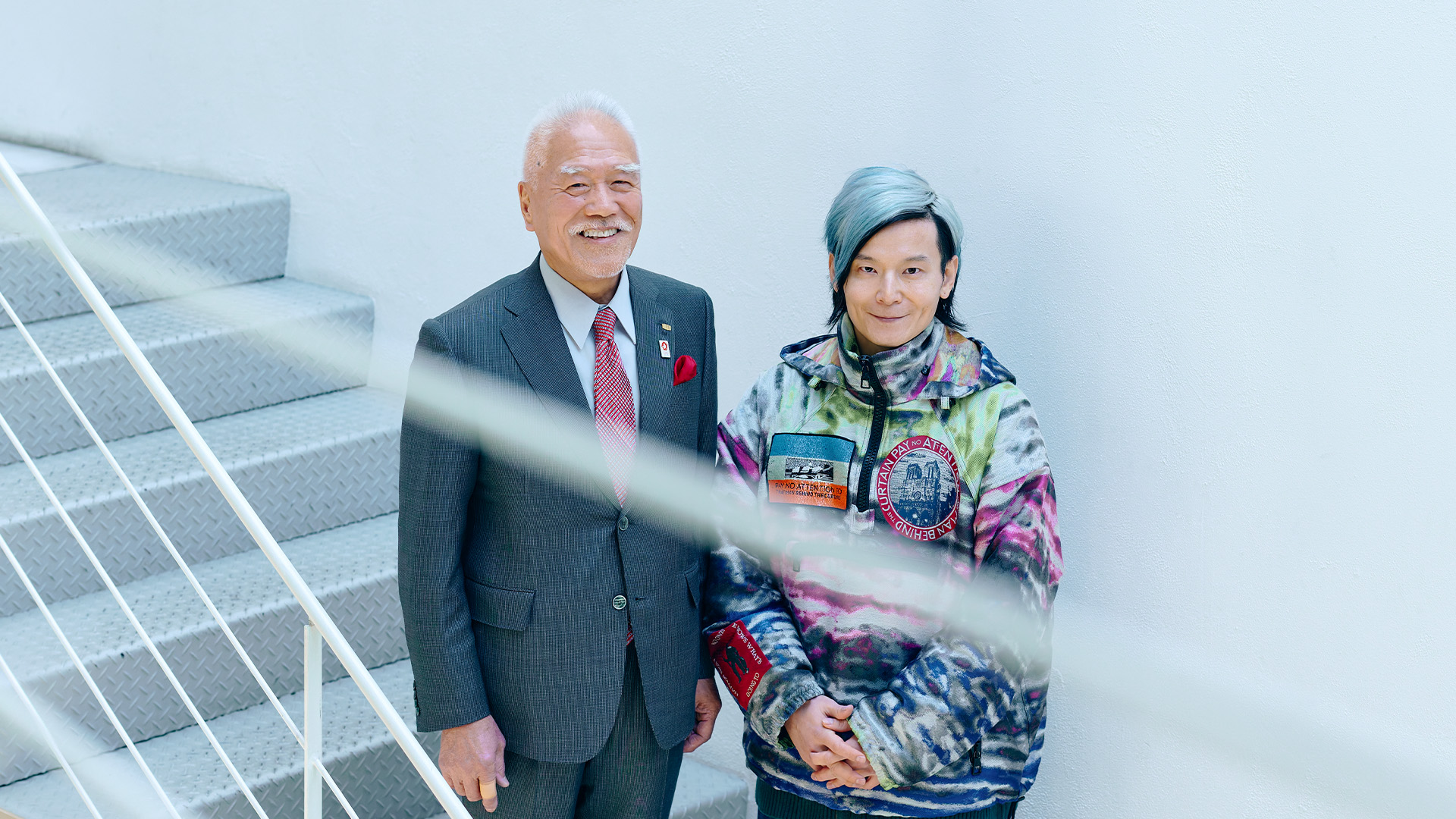
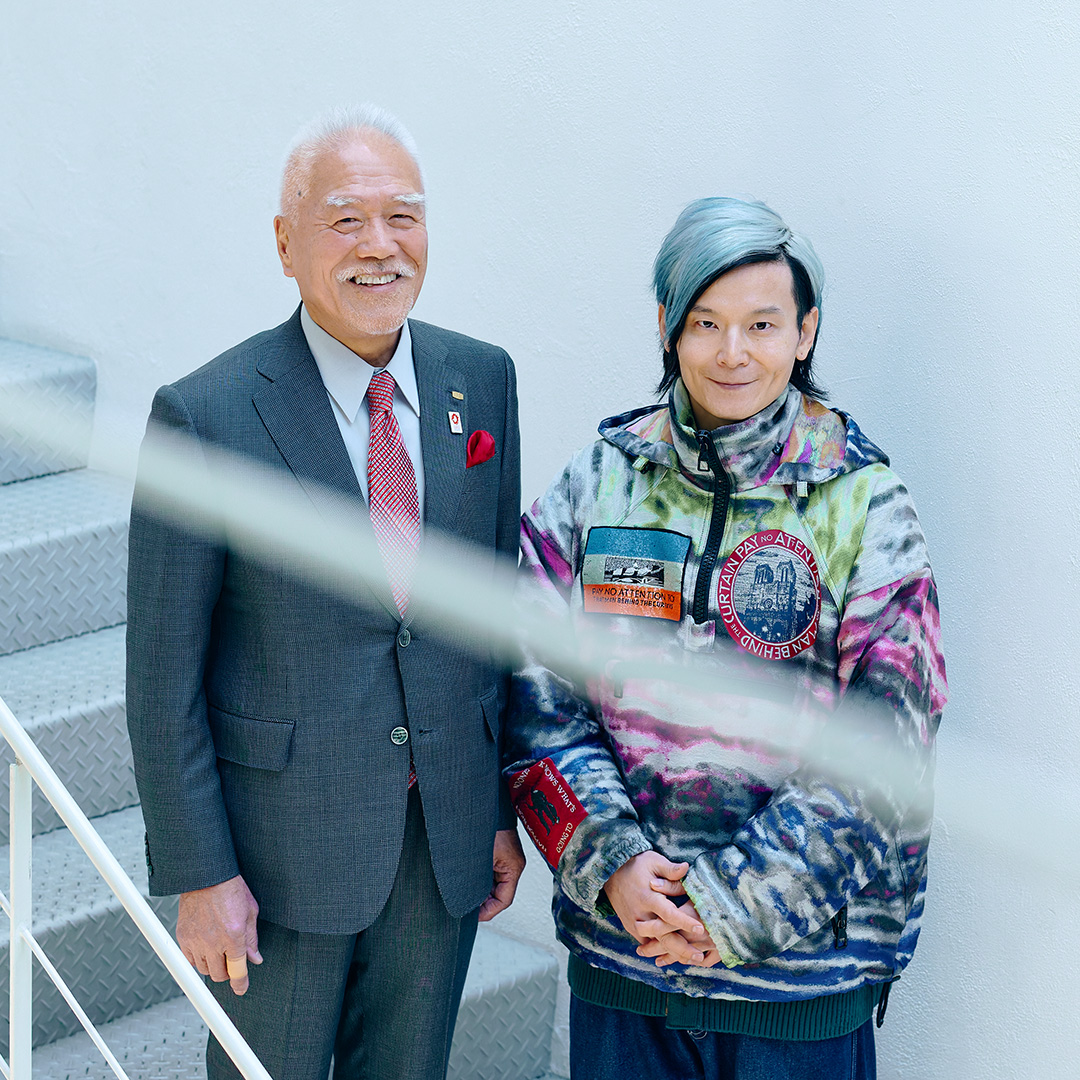


Junzo Tateno
CEO of UNION Corporation
Born in 1947, Junzo Tateno graduated from the Faculty of Law at Konan University (Kobe, Japan) in 1970
and entered Aoki Construction that same year. He joined UNION in 1973 and became CEO and President in 1990.
He serves as Chairman of the Union Foundation for Ergodesign Culture, a Public Interest Incorporated Foundation,
and the Osaka Industrial Bureau. He is also Vice Chairman of the Osaka Chamber of Commerce and Industry.
Hiroaki MIYATA
Data Scientist and Keio University Professor
Born in 1978, Hiroaki Miyata specializes in data science, scientific methodology, and value co-creation. His research centers on promoting social reform towards a better society by utilizing the power of data science and other scientific methods. He works on a range of projects within and outside the field of medicine. This has included the National Clinical Database initiative involving 5,000 hospitals around Japan connecting with specialist medical systems, and a Covid-19 nationwide survey using social media (LINE) led by Japan’s Ministry of Health, Labor, and Welfare. He also works with the Japan Business Federation (Keidanren) and the World Economic Forum to develop a new vision of society.
Miyata is also Producer of a theme pavilion at the Expo 2025 Osaka Kansai, and a candidate for presidency of the forthcoming Co-Innovation University (scheduled to open 2026 in the Hida Takayama Region, Gifu Prefecture).
19
TATENO
Professor Miyata, you are a producer of one of the signature projects at Osaka Expo, “Better Co-Being, Resonance of Lives”. What is the thinking behind this theme?
MIYATA
Put very simply, we want to transform away from being an economy-centered society to one that allows every individual to shine in relation to a variety of shared values. As you know, Humanity has already experienced three revolutions.
TATENO
You mean the agricultural, industrial, and information revolutions?
MIYATA
Yes. The Agricultural Revolution changed the way food was produced. It also made it possible to accumulate wealth but created a social hierarchy. Then the Industrial Revolution brought mass production and consumption. It changed the economic system completely but further widened the gap between rich and poor, one based on capitalists and workers.
TATENO
And now the Information Revolution is based around data.
MIYATA
Yes. It has been with us for several decades already, starting with the early Internet. We have seen great changes in society alongside the massive development of the ‘Big Tech’ companies. I'm talking about Alphabet (Google), Amazon, Apple, and Meta (Facebook). And now we have the rise of generative AI. The world is entering a new phase, one that's going to transform the very nature of society itself.
TATENO
So, you think we are now right in the middle of that information revolution?
MIYATA
That's right. If we ask, what is the essence of this information revolution - it's about the connectivity between people. Until now, our connections have always been fragmented, for example, within the old feudal system and large-scale economic system later, people were connected to each other but only within the limits of that system.
TATENO
That is not going to be the case from now on?
MIYATA
From now on, the individual way of life of each person will overlap and resonate with those of other people to recreate society. I feel we are now at a turning point, so I chose the theme, ‘a resonant society.'
TATENO
Please tell us a little more about this 'Co-being'.
MIYATA
Our ‘Co-being Pavilion’ promotes the concept of 'Better Co-being.' People have long expressed a feeling that “there are more important things than money”. Well, this sentiment can be visualized digitally. We are now in an era where we can realize the ideals of moving towards the future while also respecting the environment, life, human rights, education, etc.
TATENO
And the ideas of ‘sustainability’ and ‘SDGs’ have become widely understood, havn't they?
MIYATA
Yes, and another important thing is to have a sense of ‘well-being’ – that state of feeling satisfied both physically and mentally. However, if it is only ourselves who are feeling good then, overall, the world will only decline. Having said that, it is not a good thing for any of us to become unhappy by martyring ourselves for greater world righteousness. Therefore, the idea of 'Better Co-being' is about how we can harmonize the two. We want to create a space where all of us can, together, consider the kind of future we should be aiming for.
TATENO
That is a wonderful vision. However, when we consider Japan and other parts of the world, social disparities are actually widening. I’m thinking, for example, of the problem here around single mother poverty. Some children cannot go to university due to financial difficulties whereas those born to affluent families can receive a good education. So, at the present time, it seems difficult to realize this "co-being."
MIYATA
I agree. Initially, there were hopes that the information revolution would bring people together. It would help them empathize more deeply with each other. In reality, and sadly, the divisions are only accelerating. One reason is that the internet is also used to make money so maximizing time spent online has become a goal in itself. By always being online people tend to only consume information that suits their comfort zone. Such narrow exposure only encourages narrow-minded or extreme thinking – something that’s happening all over the world.
TATENO
It is certainly evident within social media.
MIYATA
I hope to help change that with this World Expo, even if only a little. What we need to do is focus not only the comfort of making money, but also ask ourselves how we can visualize various other values and, beyond that, how they can be matched with our way of living. The other thing is to assist those who fall below the average income.
TATENO
Indeed, that is important. It is also the issue with many single-mothers in Japan.
MIYATA
Yes. As a country, during our periods of high economic growth, Japan has been extremely successful in delivering an average level of services equally, including medical care. But when some people fall below the norm, the situation they face is harsh. On the issue of single mothers, the woman’s right to divorce should be respected on equal terms. However, more than 50% of single-mothers are only working in non-regular positions, with the obligation to support their children tending to fall morally and legally on them.
TATENO
I see, so more than half of them are non-regular employees. Yet it is still the women who are put under the most pressure to assume childcare responsibilities.
MIYATA
If those difficulties are compounded it can affect the mother’s health to the point where she cannot make ends meet. The poverty rate for single-parent households in Japan is higher than even the United States, a country of greater inequality otherwise. Indeed, it's the highest of the 38 OECD countries. From now on, I think we need to aim for a society that aims not only to support all to an average standard but also support more diverse people groups within it.
TATENO
It’s a problem we should not ignore, and a difficult one.
MIYATA
It has been difficult until now because looking after people costs time and money. It has been provided like a luxury service for those who could afford it. Now however we have data and AI which, if we can apply them well, can help us support everyone at very little cost. I want to present this turning point in our times at the Osaka Expo.
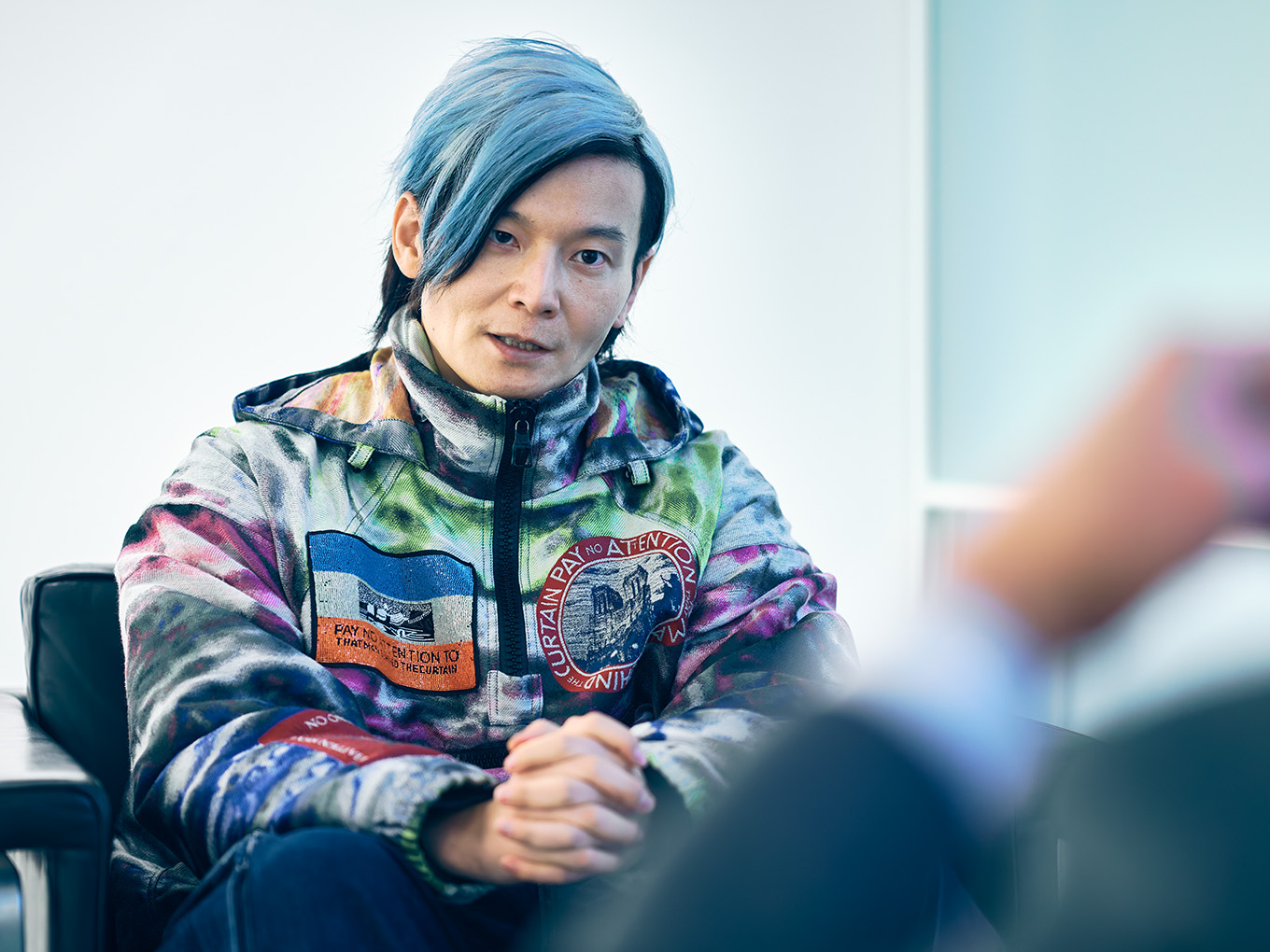
TATENO
The downside of too much focus on the ‘average’ is also seen in the education field. There’s a true story of a student not able to pursue the research he wanted to do within Japan’s conventional university system, so he went to Australia having been accepted immediately. Now, there’s a Japanese university seeking precisely his unique talents, so they have invited him to join them. I feel it is time for Japan to think more about how to better nurture these people with special talents, and less about catering to the average masses.
MIYATA
That is so true. Japan's over-respect for average standards is, for example, very evident even in clothing. In a Western context, a dress code is about expressing individuality within a certain set of rules. But in Japanese culture, there’s a tendency to regard it as being something intended to remove individuality. Today I see that you are wearing a very elegant pocket chief. I advocate the importance of diversity so I too believe we should also express ourselves through clothing.
TATENO
Will the tentatively named ‘Hida Takayama Co-Innovation University’ (due to open in 2026) provide an education that fosters diversity and individuality? I ask because I note you are a candidate for the presidency.
MIYATA
Yes, that's right. From an education industry viewpoint, and with a declining birth rate, sceptics ask whether there is any real need to increase the number of universities in Japan. However, it is education itself that needs reform so that we can support more diverse ways of life. Speaking of industry, the economic growth of the U.S. and Japan have been totally different over the past 20 years.
TATENO
The impression I have is that the American economy has continued to grow - especially with IT companies - while Japan's economy has remained flat.
MIYATA
The top giants in the U.S., namely Google and Apple, have been able to grow thanks to innovation, something Japan has not been able to achieve. So, when it comes to what should Japan do, I think we need start-up universities to take on the challenge and create new initiatives in education.
TATENO
What kind of 'new initiatives' are you talking about?
MIYATA
Traditional education, which involves acquiring knowledge and answering set questions, has been coming to an end for some time. Now we have Google Search and can rely on generative AI to sort out issues. So, what I think humans should do from now on is to focus on constructing questions. We should ask ourselves questions, inquire into new issues and solve them.
TATENO
The key point here is the ability to inquire.
MIYATA
Yes. We will have this new start-up university in the Hida Region, and we are also planning to establish around 13 other centers in Toyama and other locations. These will develop programs that ask real questions while confronting the social issues and resources of each locality. If industry, academia, and government work together to create a future in these places, new jobs will emerge, and new people will settle there. I would like to make Hida a place where people can learn how to create such a future.
TATENO
I also have the privilege of serving as director of a conventional college. In such environments I don't think the kind of ideas you're talking about can emerge so easily. Of course, I think it's important that individuality is fostered instead of having everyone do the same thing, but I fear things won't go in the desired direction once the government becomes involved. *Laughs.*
MIYATA
There are indeed some challenges. *Laughs.* While we do naturally wish to have the government’s cooperation, Japan's administrative system is usually focused on protecting what exists already, so innovation may not be possible unless we start from a different perspective.
TATENO
On the subject of diversity, people in Japan are calling for an increased proportion of female executives. However, I feel there is still no corporate culture here that fosters female employees in the true sense of the word. Even if we increase the number of female executives to 30%, would that be enough? I don’t think we should obsess too much about the ratio. Instead, we should aim to recruit and train people in a way that will bring overall employee growth and growth to the company. What do you think Professor?
MIYATA
First of all, just as with the issue of single-mother poverty, women in Japan face an especially difficult environment compared to the rest of the world. We need to change that at a fundamental level. On top of that, considering more diversity, men also need a certain degree of liberation. Men feel great pressure to work, to aim for advancement, and so on.
TATENO
I believe that the roles of men and women in the home should be more equal.
MIYATA
To take this a little further, I think we should change the way we regard child-rearing as a family-only responsibility. For example, in Scandinavia, the declining birthrate has been improved by creating a system in which society also helps to raise a child after it has been born.
TATENO
That would also help single mothers.
MIYATA
I think that only when we have a situation, like in Scandinavia, where life choices are considered gender-neutral will women be able to pursue a career in the same way as a man. The ratio of male/female executives is only one indicator, but it does need to be improved fundamentally if a different way of living is to be opened up.
TATENO
The number of married couples who both work is increasing, and the birthrate is declining, but it is important to think about the raising of children in society as a whole. Japan has implemented various measures to combat the birthrate issue, but I struggle to see any real results.
MIYATA
Other measures to tackle the low birthrate through alternative approaches have been postponed due to funding issues, so the actual situation remains unclear. One approach is to let people choose to have a family with the assurance that, while it is the individual who gives birth, it is society that raises the child. Another approach is to free people from old-fashioned gender roles.
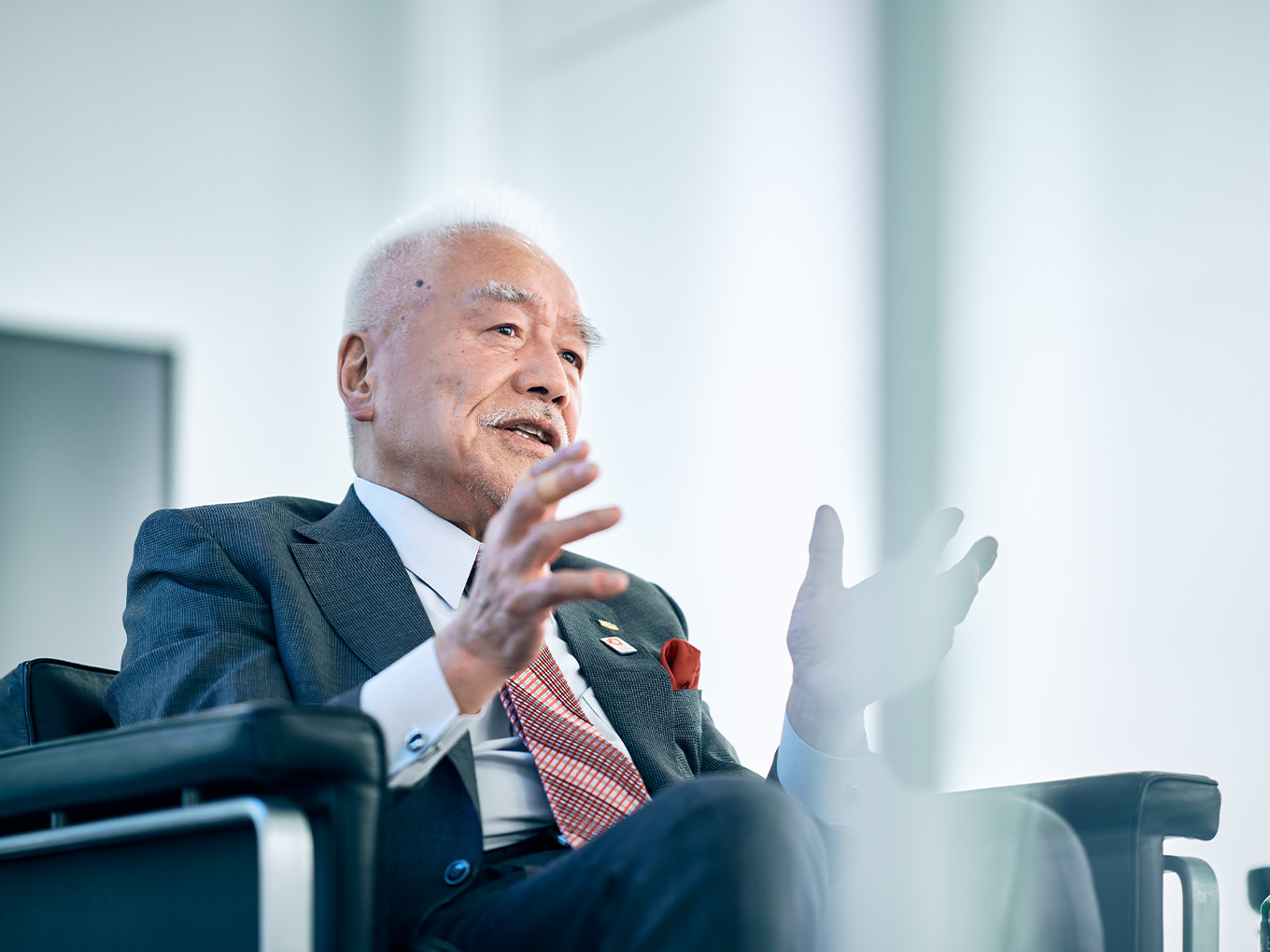
TATENO
There was a project dubbed the “Osaka Track” wasn’t there? It was proposed at the time of the G20 Osaka Summit by then Prime Minister Abe. It was about drafting international rules to govern the free movement of data and electronic commerce. What are your thoughts on this?
MIYATA
In January 2023, Digital Transformation Minister Kono brought up this DFFT (Data Free Flow with Trust) plan again at the Davos Conference. There was some momentum to promote it, but in Japan it is not yet widely accepted. It has been clouded by issues relating to the ‘My Number’ card.
TATENO
Yes, that’s what I understand.
MIYATA
In fact, the Expo will become a microcosm of future society in which digital money exchanges are used instead of cash. Furthermore, previous Expos up to Dubai didn’t link the various pavilions together but this time a system will be used that allows individual pavilions and events to work together.
TATENO
You mean this Expo will be the first time to try out such a system?
MIYATA
Yes, although I think it will take quite some time for Japanese society and the wider world to become one big digital valley. Nevertheless, if we create such a valley inside the Expo venue it will be a great opportunity to experience what will happen and what is possible.
TATENO
Now you have me really intrigued. Can you tell us a little more about what to expect?
MIYATA
For example, until now the flow of money based on paper banknotes has been invisible. But with digital money we will be able to visualize everything. (Allow me to explain). When Japan had its period of rapid economic growth, our GDP began to approach that of the U.S., the world's largest economy.
TATENO
Yes, I remember. People began to talk about “Japan as No.1”. The momentum was incredible.
MIYATA
However, in terms of actual money flow, Japan's international presence was nothing like that of the United States. The reason was that America spent three times as much money as they were earning, whereas Japan spent only one third. This was a major issue for Japan itself.
TATENO
In terms of money’s influence alone, the gap was, I believe, almost 10 times wider. Japan has been a country that doesn’t invest much.
MIYATA
Even in Japan today, the Kishida Cabinet is calling for a shift away from savings to investment. That will be difficult to achieve if things continue as they are. But I believe that if we use only digital money systems various new motivations will appear for people to shift toward investing. For example, while we are making efforts to reduce the environmental impact of our transport systems, people would happily change their behavior if they could win some points by choosing a low-carbon travel option a bicycle or train for example.
TATENO
I see. So, it is possible to lead people to use eco-friendly transport naturally.
MIYATA
When investigating corporate activity, we can discover that, while one company is contributing to human rights protection another is shamelessly exploiting developing countries. However, when the flow of corporate money is visualized in digital form, we can all see not only the money aspect, but whether a company is contributing to improving peoples’ lives or not. Society will change completely. I am hoping this Expo will serve as a testing ground to present a future society like this.
TATENO
That’s a really wonderful concept. I don't think we’ve seen it used in any of the Expo’s PR to date.
MIYATA
Before an event, it is the negative points that inevitably get the attention, so it's difficult. Apparently, there was much anti-Expo sentiment before Osaka Expo '70 opened.
TATENO
Yes, there was. But afterwards that Expo became instantly popular.
MIYATA
As an Expo producer it's frustrating to only be able to reveal such little information in advance. We will try to show much more from now on.
TATENO
I’m looking forward to it. Having said that, I’m old-fashioned about some things, so I do have my concerns about the digital society. I worry that individuals will be over-controlled, which is the main concern around Japan’s ‘My Number’ card system.
MIYATA
It’s a question of how to guarantee reliability. That was precisely one of the ‘Osaka Track’ goals. The most successful information revolutions have taken place in the U.S. (Silicon Valley) and in China. In Silicon Valley, companies had complete authority to handle data. Then e-commerce became central, and they started to give sweets to diabetics and sell alcohol to alcoholics - the most profitable way of making money.
TATENO
Those are extreme examples. In China, the government has a monopoly on power.
MIYATA
Yes, it’s very scary. It is by the judgment of the government alone that big decisions are made. We need to create a society in which data can be handled with confidence by visualizing the mechanisms that protect human rights and the global environment. In this sense, Japan is expected to have a neutral role between America and China. I think Japan's future will expand by creating such a trusted network, and the World Expo can serve as a turning point.
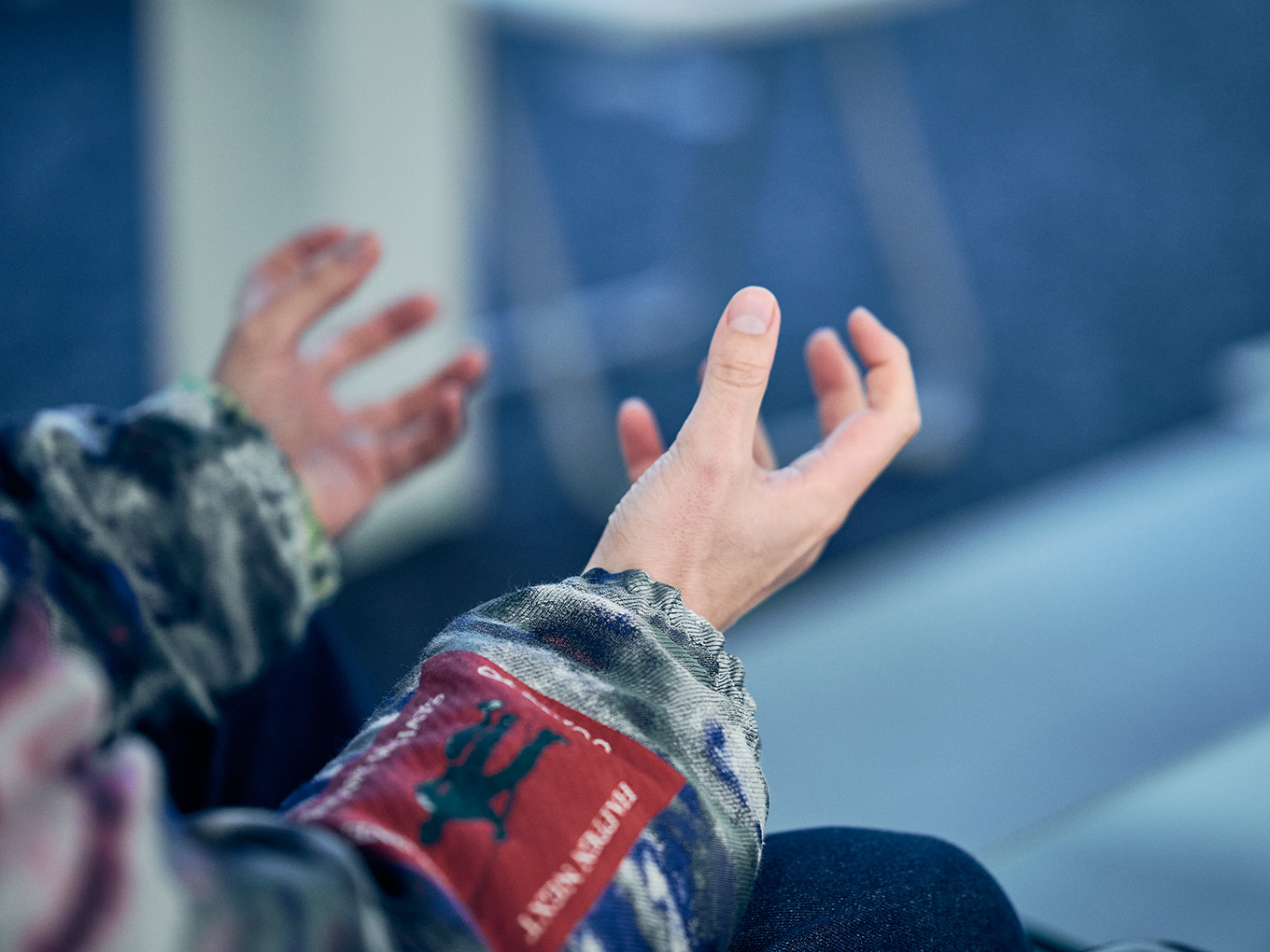
TATENO
Japan has already become a super-aged society. If we could collect and manage more data on the health of our elderly, would we not be able to prevent illness before it occurs and reduce medical costs? I feel we can make good use of data in other areas too, and that Japan has the potential to make great strides forward.
MIYATA
The aging of society is labelled a ‘social issue’ but extended longevity has always been one of mankind’s most fundamental dreams. If people can live a long and healthy life, during which they can work until the end, then there is no burden to society. But, until now, people eventually get sick, go into hospital where a lot of money is spent to treat them.
TATENO
It is difficult to prevent illness from occurring. Will that ever be possible?
MIYATA
There are things that can be done before an elderly person becomes immobile and housebound or falls victim to dementia. If we can help them deal with symptoms, as their walking begins to slow down and decrease, we may be able to halt the decline. Then the elderly can live independently for a longer time.
TATENO
Even the elderly now carry a mobile smartphone, don't they?
MIYATA
Yes, they do. So it will become possible to use data collected by their smartphones to provide personalized support as and when they need it, and without compromising their privacy.
TATENO
I hope the Expo will trigger some major social changes. If our elderly can maintain good health, continue to work, and reduce the nation’s medical costs, that money can be channeled into raising more children. Then Japan will become more affluent for all.
MIYATA
I hope that we can find that brilliant light ahead together.
TATENO
In Japan, there is a tendency for retired people to step back from society whereas I think our senior folk still have more to offer, and should offer, to society.
MIYATA
I agree. The physical ability of elderly people in Japan today is very different to their predecessors around 30 years ago. Most of those in their 70s and 80s now can still move around without difficulty. So, creating places where those of them who want to work can do so is good for their health and for all of us. I believe that matching up the willing elderly with the working population will play an important part in solving the problems of a super-aging society.
TATENO
However, the elderly are the least proficient generation within society when it comes to using digital technology. That concerns me. I know the digital society will be more convenient but even as we become a cashless society, I still remain a cash person.
MIYATA
That is certainly something we need to think about. One of Steve Jobs' key achievements was to convert digital devices into tools that everyone can use intuitively – by small children and elderly alike - not only technology enthusiasts. Even so, this has not been enough. We absolutely must create interfaces that older people can use easily.
TATENO
I would like to see a much greater effort by the government and others to lower digital access barriers for the elderly. If that doesn’t happen, we will always find things far too complicated. We may even turn against it, or at least struggle to catch up for the rest of our lives. *Laughs.*
MIYATA
In China, there was an instance when digital money was used by hundreds of millions of people during one month. It was due to a famous campaign where if you gave your grandchild digital money as a New Year's gift, the recipient would receive double points. Many elderly people switched to digital money because they wanted to see the happy smiles on their grandchildren’s faces.
TATENO
Yes, benefiting grandchildren can be a powerful motivator.
MIYATA
In future I think it will be important to create many more fun examples so that people enjoy using digital money.
TATENO
On a different subject, there was an earthquake on the Noto Peninsula just as 2024 began, an event we will probably all forget about in a few years’ time. My recent ancestors are from Noto, and when I called relatives back home, I couldn't get through. Yet, we should be able to anticipate situations like this. In disaster areas the SpaceX satellite communication system seems to have proven useful. So, I wonder why Japan doesn’t learn from past earthquakes and use something like this.
MIYATA
Indeed, there should be a system on permanent standby to provide satellite links to auxiliary lines for crisis management in areas where communications are disrupted by disaster.
TATENO
I heard that Japan’s Self-Defense Forces could not be sent to the disaster areas without a request first being issued by the local governments affected. But more lives could have been saved if the Prime Minister had exercised his authority and dispatched forces immediately. Experts tell us that the next big earthquake will come from the Nankai Trough fault line. We should learn from the past and use all the data we have gained so far to create a country always ready to act when disasters occur.
MIYATA
Like you say, that is one of data’s roles. In any difficult situation where solutions are needed, when we analyze the data afterwards, we see where the responses went well. But we really need to identify what factors caused things to go less well and seek to improve those first. In the Noto earthquake case, a great deal of suffering could have been reduced, with less disruption to the victim’s daily life, if we had better matched secondary evacuation sites with the places where the people first took refuge.
TATENO
Apparently, the dispatch of volunteers was not well matched to the actual needs of the local communities.
MIYATA
The reason was that the volunteers were not properly databased. They couldn't figure out who to send or where to send them. In the future we need to carry out countermeasures that make good use of all lessons learned and convert it into data.
TATENO
Yes. As a country frequently hit by earthquakes, I really hope we can put our many past experiences to use.
MIYATA
One thing gained from the Great East Japan Earthquake of 2011 and used effectively during the Noto event were the media announcements urging people to “escape the tsunami”. There is more we can learn here. For example, we can use digital technology to identify the higher-risk places and those less at risk. Those less dangerous places will of course have other issues to face. Ultimately, it should be possible to provide coverage that is more useful for specific locations than just focusing on tsunami probability.
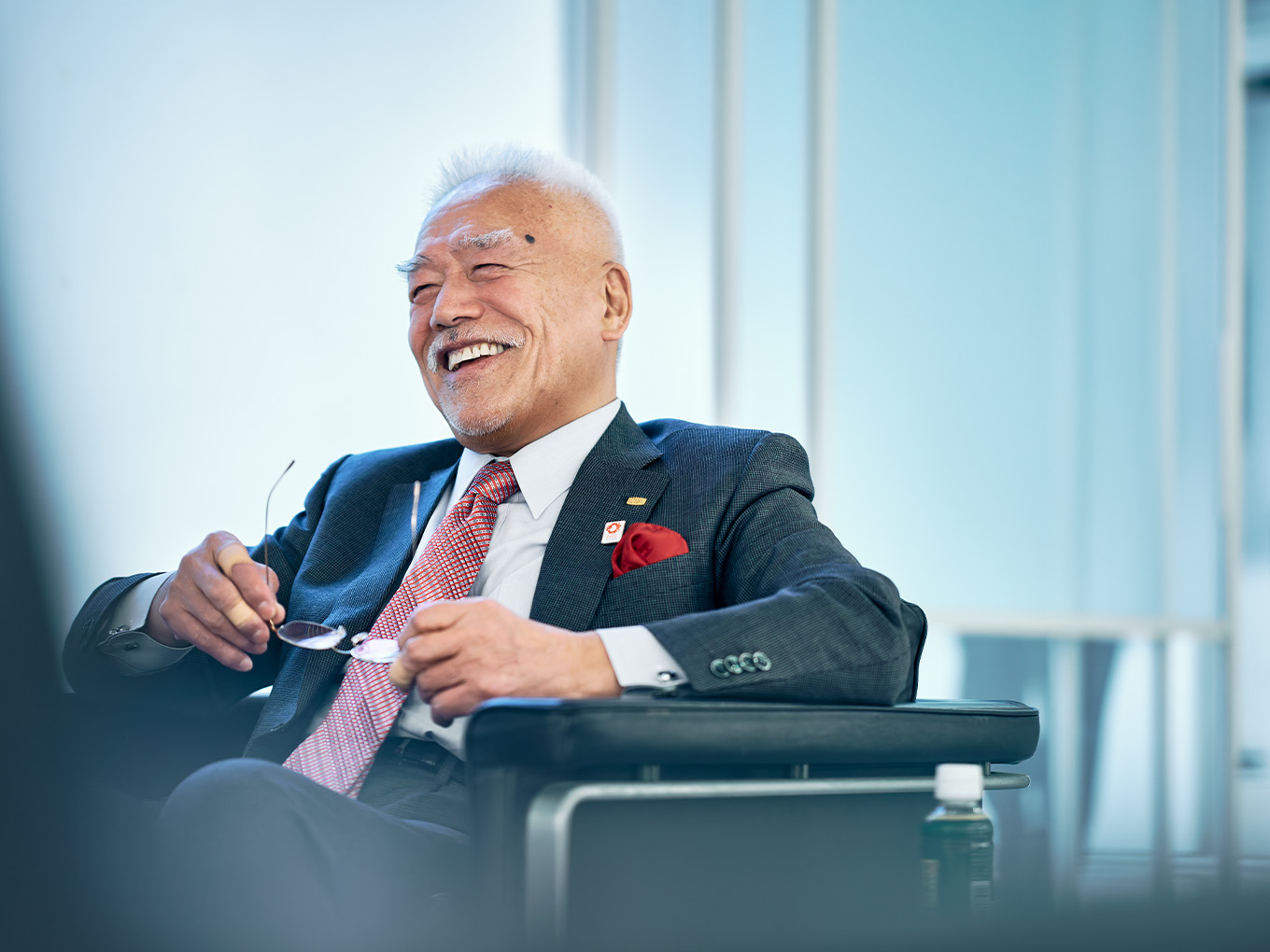
TATENO
Immediately after the Noto earthquake, there was an aircraft collision at Haneda Airport. Isn’t digital technology already used extensively in that field?
MIYATA
According to those involved, they were working with an analog system. The accident might not have happened if they had been using a digital control system, which would not allow a pilot to proceed without permission. I’m sure the cost of installing such a system would have been far less than the cost of the damage caused.
TATENO
It is not only in our airports, but digital / analog systems probably exist patchwork-style in many other workplaces around the country.
MIYATA
I think it is high time for each industry to move quickly and break from this situation. They must transform the way they create systems to one based on digitalization.
TATENO
It’s the same in architecture and construction which I’ve been connected to for many years. Construction is not possible unless you employ many people and there is currently a real shortage of labor in Japan. During the Covid pandemic very few workers could come in from overseas and this has delayed our human resource development. It’s especially difficult to hold a World Expo without securing enough manpower so, in view of the situation, I think the construction industry must utilize more digital technology. I’m hoping that you can play a role in this as well.
MIYATA
I’ve learned a lot about the construction industry through being involved in the pavilion for Expo2025 and the university in Hida Takayama. I feel that DX (Digital Transformation) applied to construction can create new possibilities.
TATENO
With the Expo just around the corner I think now is the perfect opportunity. It worries me that if we cannot reform our DX strategies Japan's industry won't be able to survive.
MIYATA
As I’m not managing the construction side of World Expo I had not thought about it so much. However, with the involvement I have had, I do think there may be solutions to those challenges. I will give it some real thought.
TATENO
Based on what I have heard from overseas, there are many things that don't go well when left to Japanese general contractors who are less advanced in DX.
MIYATA
I was talking to Mr.Tadao Ando about this and he thought that, even on a 7-hour working day per person basis, they could increase the daily working period by having the teams work in shifts instead of all being on site at the same time. Even if that does push daily costs up a little, the extra would be mitigated by shortening the overall construction period. That approach is feasible, he said, by using digital technologies. I agree with him - it should be possible for DX to make construction processes more efficient.
TATENO
I would also ask you to introduce such innovation to the construction industry overall. The last thing I wish to say is that I hope very much that children will visit the Expo site multiple times. I also hope they will be moved and inspired by the pavilions you have been thinking about to gain both a sense of what society will be like in the future and an idea of their own path forward.
MIYATA
In November 2023, a discussion forum was held for those involved in the Expo’s foreign pavilions from all around the world. Children were also invited along. We asked this diverse group various questions and what they would like to do at the Expo. Their ideas were most interesting and, as someone from an older generation, I was really inspired by the brightness I saw in the kids’ eyes. So we want to continue offering these opportunities as often as possible, even after the Expo opens.
TATENO
I am in no doubt that, in the future, we will enjoy many more occasions where society can appreciate your ideas. Please take good care of yourself and I wish you the greatest success in all your future activities.
*Interview concludes*
Both
Thank you very much.
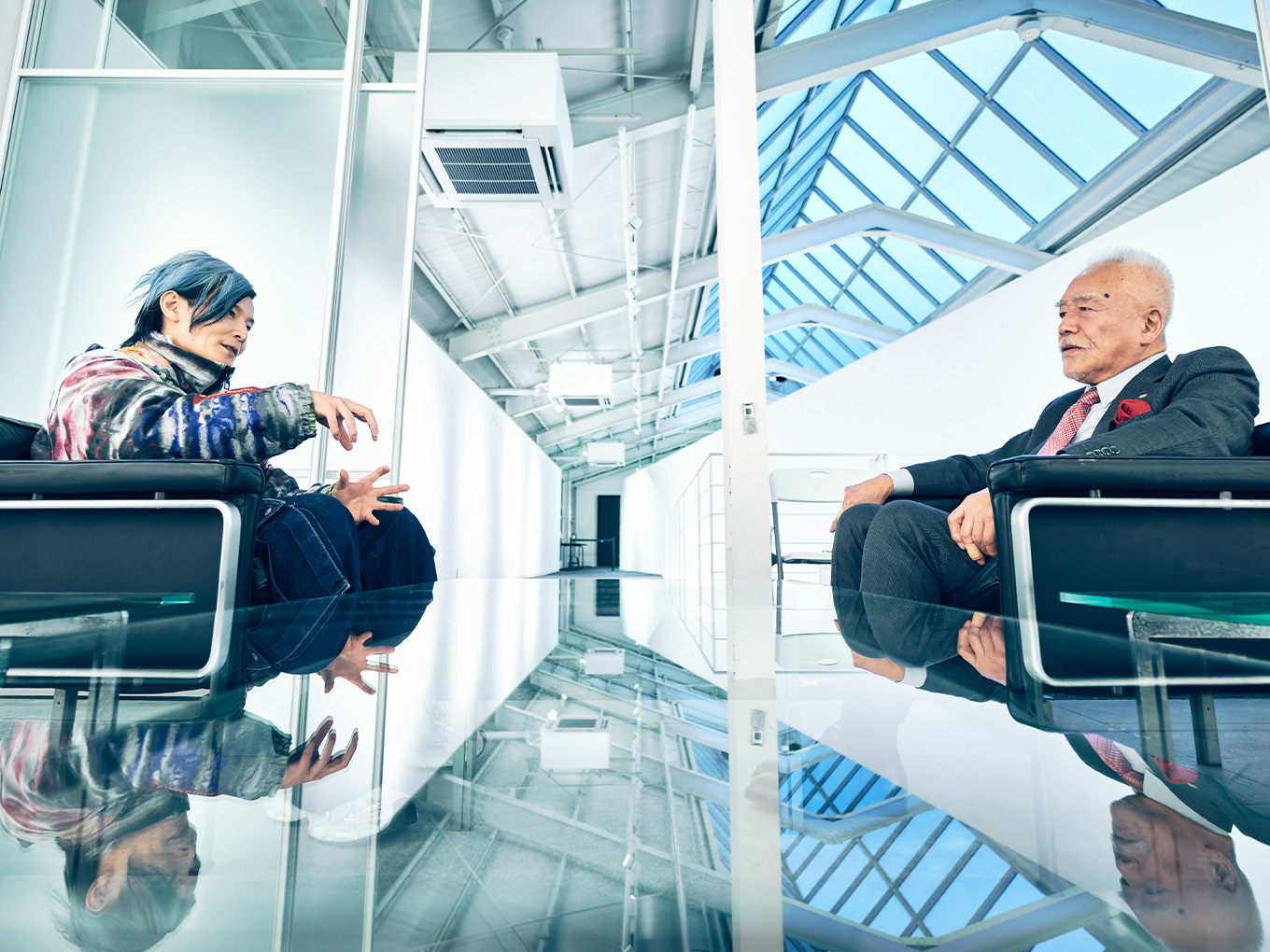
Planning: Naoyuki Miyamoto
Photography:Yasuhiro Sawao
Writing:Naoki Moritani
Web Direction : Daisuke Ozaki